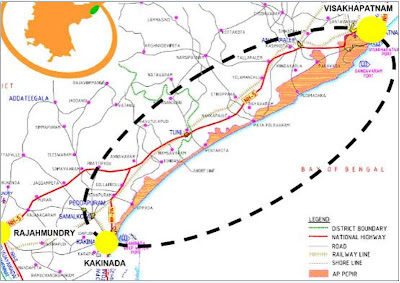


| IFC examining feasibility of various coastal roads |
KAKINADA: The Petroleum, Chemical and Petrochemical Investment Region (PCPIR) project proposed to be developed between Visakhapatnam and Kakinada, is gaining momentum with the feasibility of various coastal roads being examined by the International Finance Corporation (IFC).
Mammoth ventureThe IFC, which was recently appointed advisor of Infrastructure Corporation of Andhra Pradesh (INCAP) for the specific purpose of forging public-private partnerships for the project, is working out modalities of developing a combination of new and existing roads and connecting radial roads in the hinterland as a start-up to the State Government’s mammoth venture.
Prominent among the proposals is the road that links the seaports at Kakinada and Gangavaram in Visakhapatnam district (distance 138 km). It will be a six-lane road between Gangavaram port and Kakinada, which was originally estimated to cost Rs 1,937 crore.
A vast chunk of the expenditure is proposed to be borne by the Union Government in two phases.
Other PCPIR roads are: upgrading of State highways- No. 39 (Visakhapatnam - Anantagiri - Araku), No. 40 Kakinada - Rajahmundry via Samalkot, Bikkavolu, Anaparthi and Kadiam and No. 97 Yelamanchili - Gajuwaka, NH-214 [(Kathipudi - Razole - Kakinada - Narasapur - Pamarru (Krishna district)] and NH-214A [Digamarru (West Godavari district) - Narasapur - Machilipatnam - Challapalli - Avanigadda - Repalle - Bapatla - Chirala - Ongole].
Expanding the ADB Road (Kakinada port - NH-5) to four lanes and developing Kakinada bypass road are the other important components of the coastal road network which is an integral part of the PCPIR.
M/s Reliance Industries is in advanced stages of laying a link road in the PPP mode from Tallarevu to Gadimoga village, about 30 km from Kakinada, where it is constructing an on-shore terminal to receive gas extracted from the K-G basin.
The Vizag-Kakinada PCPIR is proposed to be developed in 250 sq. km (approximately 62,000 acres), comprising manufacturing facilities for the petrochemical industries, other logistical infrastructure and administrative and residential areas.
The PCPIR project also includes upgrading of Visakhapatnam and Rajahmundry airports, Visakhapatnam port and Kakinada deep water port, ‘logistic hubs’ containing inland container depots, container freight stations and warehouses, captive power plants and water supply schemes.
Another major component of PCPIR is the proposed refinery of Oil and Natural Gas Corporation Limited having a revised capacity of 15 mtpa and costing nearly Rs 25,000 crore. This project is still in the conceptual stage.

Hyderabad, May 29 The Union Government has agreed to support the Coastal Corridor project covering the districts of Srikakulam, Vizianagaram, Visakhapatnam and East Godavari District in the State.
“Officials from the Union Government were keen to know about the proposed Coastal Corridor such as the basic infrastructure, industries that are likely to come up in the region and connectivity issues and after our presentation, they gave an in-principle approval to the project,” Mr B Sam Bob, Principal Secretary, Industries and Commerce Department, Government of Andhra Pradesh, told Business Line. According to him, the Government will now look to develop a four or six-lane road parallel to the existing National Highway to support the port-based industries.
According to the initial plan, the Andhra Pradesh Government is looking at developing the 30-km road from Visakhapatnam to Gangavaram Port.
“The total distance that has been identified is 138 km, but we have been asked implement it in a phased manner. So, that is why, in the first phase, we are looking at completing the road from Visakhapatnam to Gangavaram port in the next two years,” Mr Bob said.
The total cost of the project, though not yet finalised, is estimated to be around Rs 5,500 crore and in the first phase, around Rs 1,100 crore has to be invested.
 With a focus on infrastructure, Andhra Pradesh, Gujarat, Karnataka, West Bengal, Orissa and Tamil Nadu are creating investment hubs that have the potential to collectively attract Rs 10 lakh crore in investments and create 43 lakh jobs in the next several years.
With a focus on infrastructure, Andhra Pradesh, Gujarat, Karnataka, West Bengal, Orissa and Tamil Nadu are creating investment hubs that have the potential to collectively attract Rs 10 lakh crore in investments and create 43 lakh jobs in the next several years. 